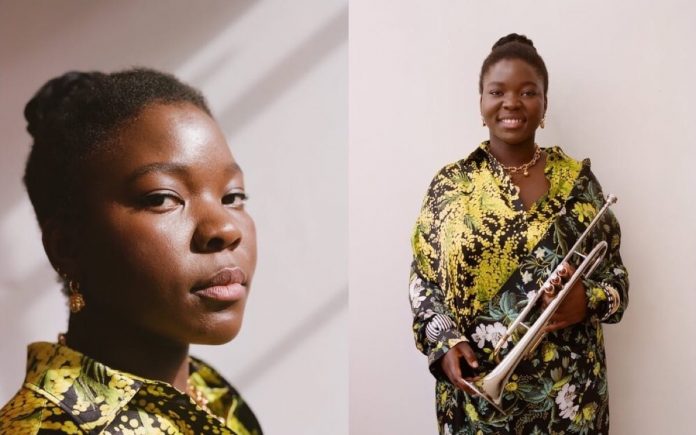London trumpeter Sheila Maurice-Grey has in recent years emerged as one of the most creative and versatile young musicians on the British jazz scene, playing crucial roles in bands like Nérija and SEED Ensemble. But Kokoroko, principally inspired by Fela Kuti, is perhaps the band with which she is most associated.
“The band started to honour the legends of Afrobeat and highlife and in order to learn that music,” she explains. “But we make original music now because we’ve developed our own sound and identity.”
In 2019 the band released a self-titled EP. “We’re introducing ourselves as a band and I hope people like it but there’s nothing amazing about the EP in my opinion,” is Maurice-Grey’s somewhat downbeat assessment.
The EP includes Uman, one of the band’s most popular numbers. “Many things inspired that track but it’s essentially a celebration of women, and black women in particular. But I don’t want to go into it. I don’t think it’s too important,” says Maurice-Grey firmly.
Another of the EP’s four tracks, the atmospheric Abusey Junction, has been listened to a barely believable 42 million times on YouTube. Maurice-Grey doesn’t exactly leap up and down with glee when this is pointed out. “It’s not like the song has a massive or deep meaning”, she notes, “but there’s something quite honest about the recording and the song and I think people just resonate with things that are honest.”
Six years after their formation Kokoroko still haven’t recorded an album. That doesn’t seem strange to Maurice-Grey, however. “Things take time. Things are allowed to take time. I’m going to leave it at that: things are allowed to take time” is her only comment on the matter.
Although the band’s music is marvellously danceable Kokoroko have played gigs to seated audiences at Ronnie Scott’s and to an empty Royal Albert Hall at the 2020 BBC Proms. “Yes, it is dance music but it’s not just that and that’s what I love about the band. We can fit into many different scenarios and places – playing to seated audiences, to standing audiences, to young audiences, to old audiences … It’s all down to your mindset: if you want to see [something] as a problem, then it will be a problem.”
Trinity Laban: ‘I wouldn’t say it wasn’t valuable but it’s not the most valuable learning experience I’ve had’
In her 20s Maurice-Grey studied at Trinity Laban. “I wouldn’t say it wasn’t valuable but it’s not the most valuable learning experience I’ve had,” she reflects. “I’ve gone through many different music programmes and the one that most transformed my playing and career was Tomorrow’s Warriors. That’s where I learned the most so music college isn’t the be-all and end-all. And even before I went to Trinity Laban I was at art college and that’s where I did a lot of my learning and growth as an adult. That was a great experience.”
Maurice-Grey hasn’t found being a black female musician in a society where racism and sexism are hardly unknown to have been problematic. “I was privileged enough to grow up in London and I went to a school where we had a really good music department so, growing up, it was normal for black girls to play instruments so that was a good start. And then in different musical programmes there was always a good balance of girls and guys.
“It was only when I was older that I realised ‘Oh my gosh, there obviously has been a problem.’ But I had the mindset that it was fine to do what I was doing and having that mindset can change the way you experience things. But I’m not trying to ignore that there are massive issues with women in the music industry, from how you’re received when you go into a venue and whether people choose to listen to you. Hopefully there won’t always be that issue.”
Maurice-Grey, whose mother and father were born in Sierra Leone and Guinea Bissau respectively, doesn’t feel any kind of an outsider on the British jazz scene. “I’m definitely part of the British jazz scene,” she asserts. “It’s important to say that the British jazz scene is not just made up of white males – black musicians have been [part of it] for a hundred years and more. So, I identify as British. I am a British black female. But I also resonate with my background which is West African. I identify with both equally – it’s not one or the other.”
Maurice-Grey has spoken of Miles Davis and Freddie Hubbard as being amongst her major influences. “I love their sound and how they interpret music and how they interpret themselves through their music. But there are many more trumpeters that I love like Lee Morgan, Ambrose Akinmusire, Roy Hargrove … there are so many great trumpeters out there and they all have very distinct sounds and individuality.”
After a few years when Maurice-Grey had the thrill of playing the likes of the Glastonbury and Meltdown festivals, last year was close to being a write-off for gigs, thanks to the pandemic. She has remained positive however. “Emotionally it’s been great to have a break from touring and from the band itself – just to rethink and re-evaluate things. Financially? I don’t know if I feel comfortable talking about that but it’s been OK. There have been other opportunities and I’ve applied for funding which has been great and I’ve been doing some session work. I understand that this is not necessarily the case for all musicians but I think finding creative ways to deal with the situation has been the way forward and will have to be the way forward for the next months or even year. We’ll see.”
















